Judi Lynn
Judi Lynn's Journal'Bolsonaro's Hero Tortured Me,' Says Journalist Imprisoned 9 Years by Dictatorship
'Bolsonaro's Hero Tortured Me,' Says Journalist Imprisoned 9 Years by Dictatorship
Antonio Pinheiro Salles, arrested in Porto Alegre, in 1970, returns to the state capital 49 years later and details torture
Jan.3.2020 1:07PM
Paula Sperb
PORTO ALEGRE
Journalist Antonio Pinheiro Salles, 82, suffered various injuries at the hand of the military dictatorship: he lost his teeth, his jaws are platinum, and he became deaf.
He was arrested in Porto Alegre in 1970. This year he left Goiânia to return to the capital for the first time since being arrested. He returned on the very day he was taken to jail: December 12th.
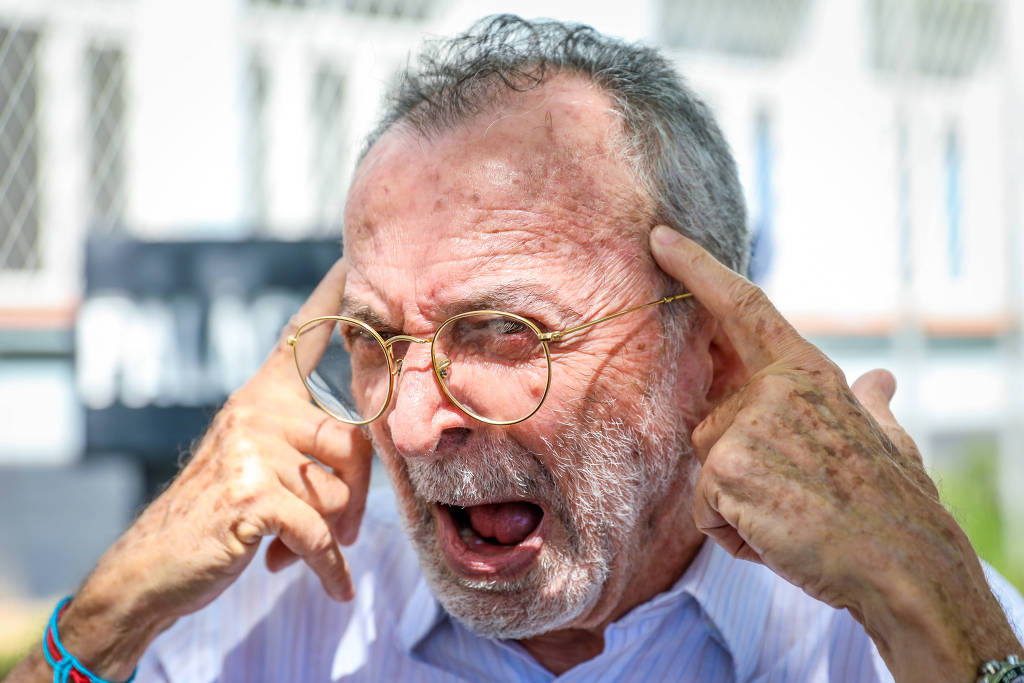
Antônio Pinheiro Salles. Foto: Marcos Nagelstein - Marcos Nagelstein
While standing in front of the building where the Dops (the organ responsible for the repression and torture in the military dictatorship)—today headquarters of the Rio Grande do Sul Civil Police—Antonio said he has no hatred. But he remembered his torture suffered there under the command of Deputy Pedro Seelig. "They inserted a bushing into my anus while hanging from the macaw stick."
He spent nine years in jail, the last one in Sao Paulo, where he suffered torture under the command of Carlos Alberto Brilhante Ustra. Ustra is a military man repeatedly praised by President Jair Bolsonaro. "The impunity of the torturers makes it easier for his hero to be the one who tortured me in the worst possible way," he said.
More:
https://www1.folha.uol.com.br/internacional/en/brazil/2020/01/bolsonaros-hero-tortured-me-says-journalist-imprisoned-9-years-by-dictatorship.shtml
This is the Brazilian torture device, the "Parrot's Perch" (Pau de Arara) originally used in Brazil as punishment, etc., against "slaves".






(Also used upon previous President Dilma Rousseff during the days she worked
as a rebel against the military dictatorship, well before she was freed and became
the President of Brazil.)

'Sinaloa Cartel paid Uribe to facilitate drug trafficking route between Colombia and Mexico'
‘Sinaloa Cartel paid Uribe to facilitate drug trafficking route between Colombia and Mexico’
by Adriaan Alsema January 3, 2020
Former President Alvaro Uribe facilitated drug trafficking between Colombia to Mexico while he was in office, the former security chief of a cargo airliner told an exiled prosecution investigator.
The bombshell allegation by the anonymous former security chief of Colombian airliner Air Cargo Lines were revealed by Richard Maok Riaño, a former prosecution agent who fled to Canada in 2002 after revealing extensive ties between paramilitary group AUC and state officials.

From Antioquia to Sinaloa
“El Mono Vides”
According to the former security chief, Uribe played a key role in setting up a drug trafficking route that allowed the late “El Mono Vides” of drug trafficking group “Los Paisas” send 10 metric tons of cocaine from Bogota‘s El Dorado airport to the Sinaloa Cartel in Mexico in 2007.
Vides, a former member of paramilitary group AUC, was killed in a police operation in the northwestern Antioquia province in October 2010.
. . .
The ties between Uribe and “El Chapo”
Alex Cifuentes
At the time of the alleged drug trafficking, Colombian drug trafficker Alex Cifuentes was the right-hand man of Sinaloa Cartel boss Joaquin Guzman, a.k.a. “El Chapo.”
Uribe’s late brother Jaime had two children with Cifuentes’ sister Dolly.
More:
https://colombiareports.com/sinaloa-cartel-paid-colombias-former-president-to-facilitate-drug-trafficking/
~ ~ ~
Related:
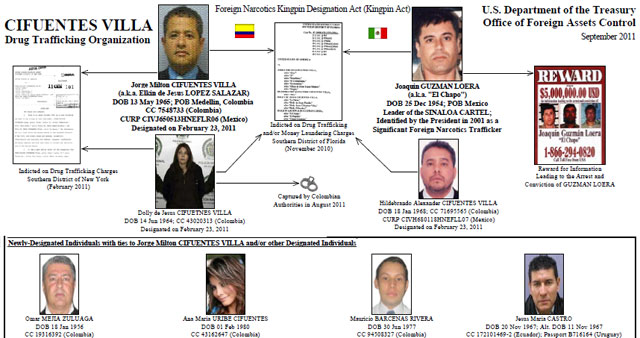

Álvaro Uribe's niece and sister-in-law arrested in Colombia for extradition purposes to the US for being “strategic partners and allies” of the Sinaloa cartel, according to the DEA

MIAMI.- A sister-in-law and a niece of former Colombian President Álvaro Uribe Vélez were arrested in Colombia for extradition to the United States, accused of cocaine trafficking and money laundering in partnership with Joaquín Archivaldo Guzmán Loera, better known as “ El Chapo Guzmán ”, head of the Mexican Sinaloa cartel.
" El Chapo Guzmán " is the most wanted criminal in the United States around the world and offers a bag of US $ 5 million for those who reveal their whereabouts.
The sister-in-law of Uribe Vélez, Dolly Cifuentes Villa, nicknamed “ La Meno ”, 48 years old, is the mother of the prisoner and charged in the same case Ana María Uribe Cifuentes, 31 years old. The father of the latter, younger brother of former President Uribe Vélez, is the late agronomist Jaime Alberto Uribe Vélez, who was also known as " Arepa " or " El Pecoso ", with Colombian citizenship card number 15367461 . He died of throat cancer in Medellín on September 24, 2001 and his mortal remains today rest in an ossuary in the crypt of the parish of Santa Teresita, in Medellín.
. . .
Both women belong to the Cifuentes Villa family clan, which, according to the DEA, introduced at least 30 tons of cocaine to the United States between 2009 and 2011 and washed drug money in Colombia, Ecuador, Uruguay, Panama and Mexico.
More:
https://www.arcoiris.com.co/2012/06/sobrina-y-cunada-de-alvaro-uribe-apresadas-en-colombia-con-fines-de-extradicion-a-ee-uu-por-ser-socias-y-aliadas-estrategicas-del-cartel-de-sinaloa-segun-la-dea/
The Amazon Has Lost More Than Ten Million Football Fields of Forest in a Decade
The Royal Statistical Society’s stat of the decade is 24,000 square miles of deforestation in the Amazon rainforest

Aerial view of deforested area of the Amazon rainforest. (PARALAXIS / Shutterstock.com)
By Liberty Vittert, The Conversation
SMITHSONIANMAG.COM
JANUARY 1, 2020
This year, I was on the judging panel for the Royal Statistical Society’s International Statistic of the Decade.
Much like Oxford English Dictionary’s “Word of the Year” competition, the international statistic is meant to capture the zeitgeist of this decade. The judging panel accepted nominations from the statistical community and the public at large for a statistic that shines a light on the decade’s most pressing issues.
On Dec. 23, we announced the winner: the 8.4 million soccer fields of land deforested in the Amazon over the past decade. That’s 24,000 square miles, or about 10.3 million American football fields.
https://thumbs-prod.si-cdn.com/ID-lLi6eFSoxxSDug3fBI7dzVGo=/fit-in/1072x0/

This statistic, while giving only a snapshot of the issue, provides insight into the dramatic change to this landscape over the last 10 years. Since 2010, mile upon mile of rainforest has been replaced with a wide range of commercial developments, including cattle ranching, logging and the palm oil industry.
More:
https://www.smithsonianmag.com/science-nature/amazon-has-lost-more-ten-million-football-fields-forest-decade-180973879/
Bolivian student arrested after criticizing interim government on meme account
She recently shut down the page after receiving death and rape threats.
Ignacio Martinez— 2020-01-02 04:48 pm
A Bolivian university student named María Alejandra Salinas has been arrested based on charges of diffusing critiques against Bolivia’s interim government.
In November, Bolivian President Evo Morales resigned with the explanation that he did so after learning police were ordered to arrest him illegally. He, along with supporters, dubbed it “a coup.” A time of uncertainty and turmoil for the Bolivian people ensued. In addition, there is also confusion online as discourse surrounding the event has been centered on whether the regime change even was a coup and if it was backed by the United States government.
. . .
To counter the possibility of state media, Salinas operated as an administrator of a leftist meme account on Facebook known as Suchel. The page quickly gained over 10,000 followers after conservative Senator Jeanine Añez Chavez became Bolivia’s interim president.
On Dec. 28, Salinas announced through social media she had decided to terminate Suchel out of fear for her safety and the safety of her family after receiving multiple death and rape threats.
More:
https://www.dailydot.com/layer8/suchel-maria-alejandra-salinas-arrest-bolivia/
Brazil Complicit in Attacks on Venezuela Military Base: O Globo

Brazil’s President Jair Bolsonaro has supported opposition lawmaker Juan Guaido in many attempts to destabilize Venezuela's government. | Photo: EFE
Published 2 January 2020 (10 hours 52 minutes ago)
The story claims that there were “high-level communications” between Brasilia and Guaido prior to the attack.
Brazil’s far-right government was well informed of the plans to attack to Venezuelan military outposts and was in direct communication with opposition lawmaker Juan Guaido prior to the incident, according to a report published Tuesday by Brazil’s right-wing media O Globo.
The story, citing anonymous sources, claims that there were “high-level communications” between Brasilia and Guaido prior to the incident as well as the known whereabouts of the fugitive perpetrators behind the Dec. 22 attack to a Venezuelan military border garrison.
On Wednesday, Venezuela’s Minister of Foreign Affairs Jorge Arreaza denounced Jair Bolsonaro’s government as accomplices of the aggression for “supporting the violent plans of armed attacks against Venezuela,” as well as harboring the perpetrators.
O Globo’s report also affirms that the original plan was to activate three military uprisings against President Nicolas Maduro on Christmas Eve, under Operation Trilogy. This included actions in the state of Bolivar on the border with Brazil, at some maritime point and at a third location near Colombia.
More:
https://www.telesurenglish.net/news/Brazil-Complicit-in-Attacks-on-Venezuela-Military-Base-O-Globo-20200102-0010.html
Amazonian chief Raoni Metuktire: 'Bolsonaro has been the worst for us'
Jonathan Watts in Altamira
@jonathanwatts
Thu 2 Jan 2020 02.00 EST
Venerated indigenous leader speaks out on the threat posed by destruction of the rainforest
Jonathan Watts in Altamira
@jonathanwatts
Thu 2 Jan 2020 02.00 ESTLast modified on Thu 2 Jan 2020 02.05 EST
At close to 90 years old, Brazil’s most venerated indigenous leader, Raoni Metuktire, has returned to the spotlight to challenge the man he calls the worst president of his lifetime, Jair Bolsonaro.
In an interview with the Guardian, the Kayapó chief said he wanted to speak out about the far-right administration’s plans to allow mining in indigenous territory and he warned that Brazil’s Amazon policies threatened global efforts to protect nature and address the climate emergency.
“Ï have seen many presidents come and go, but none spoke so badly of indigenous people or threatened us and the forest like this,” he said. “Since he [Bolsonaro] became president, he has been the worst for us.”
. . .
Even before entering office, Bolsonaro frequently abused indigenous groups as an obstacle to economic development. “It’s a shame the Brazilian cavalry hasn’t been as efficient as the (North) Americans who exterminated the Indians,” he said in 1998. Now in power, he has promised to halt demarcation of new reserves and to open up territories to mining and agriculture businesses. Anthropologists have warned these actions will result in the genocide of uncontacted tribes.
More:
https://www.theguardian.com/world/2020/jan/02/amazonian-chief-raoni-metuktire-bolsonaro-has-been-the-worst-for-us
Tallest tree in the Amazon found by University of Cambridge researchers
By Paul Brackley- paul.brackley@iliffemedia.co.uk
Published: 10:12, 01 January 2020 | Updated: 10:15, 01 January 2020
Scientists have discovered a tree in the Amazon that is 30m taller than the previous record holder.
Researchers at the University of Cambridge joined an expedition to confirm the height of the Angelim vermelho (Dinizia excelsa), which proved to be an astonishing 88.5m.

The tallest tree in the Amazon. Picture: Toby Jackson
It was one of a group of giant trees found in this remote region of north-eastern Brazil and suggests the Amazon’s importance for storing carbon may be even greater than thought. Just one of these magnificent trees is thought to store as much carbon as a hectare rainforest elsewhere in the Amazon.
Toby Jackson, a plant scientist at the University of Cambridge Conservation Research Institute, joined the epic quest to find the tree, which had been identified using data captured by laser scanning from a plane.
The group set off by boat from Laranjal do Jari in north-eastern Brazil. In 35C heat, they headed for the community of São Francisco do Iratapuru, where villagers provided four boats and 12 people to guide them through the forest.
More:
https://www.cambridgeindependent.co.uk/news/tallest-tree-in-the-amazon-found-by-university-of-cambridge-researchers-9095095/
5 Big Archaeology Discoveries to Watch for in 2020
By Owen Jarus - Live Science Contributor 14 hours ago
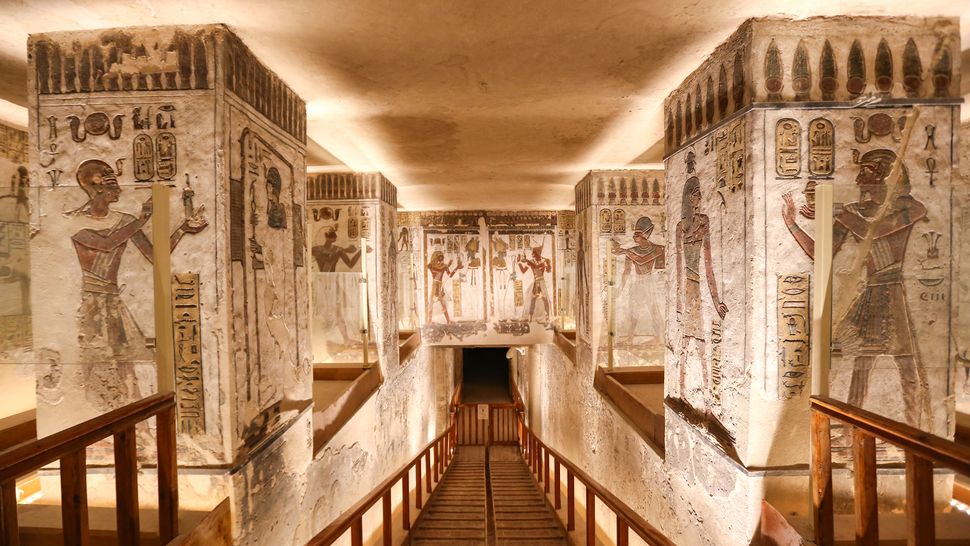
(Image: © Shutterstock)
New discoveries in the Valley of the Kings, looted art from Venezuela and evidence that humans were in Central America more than 20,000 years ago are just some of the stories Live Science will be watching out for in 2020.
Tombs of pharaohs and queens in Valley of the Kings
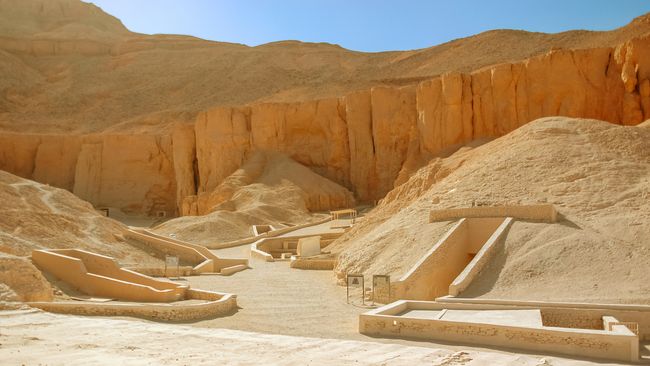
(Image credit: Shutterstock)
Egypt's Valley of the Kings, which holds the tomb of King Tut and other Egyptian royalty, divulged several of its secrets in 2019, including a workshop complex, mummification cache, ostraca (pottery with writing on it) and newfound mummies. Excavations were carried out in both the east and west valleys of the Valley of the Kings and was funded in part by media companies that are paying for the right to film the excavations.
Excavations in the east and west valleys of the royal cemetery are ongoing; the artifacts found in 2019 are still being analyzed, and hieroglyphic writing on the ostraca is in the process of being deciphered. With all this work going on, it's likely that more discoveries will be made in the Valley of the Kings in 2020. Zahi Hawass, the former Egyptian antiquities minister who is leading work in the valley, believes that several tombs built for the pharaohs and their queens have yet to be found.
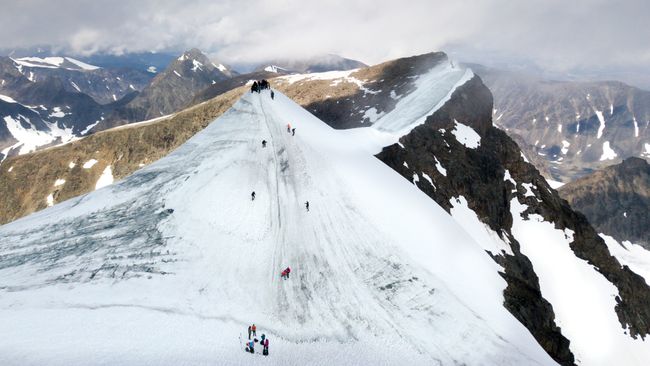
(Image credit: Shutterstock)
The melting of permafrost in the Arctic and sub-Arctic is causing the remains of both humans and animals to thaw and decompose, giving local inhabitants a smelly problem to deal with.
More:
https://www.livescience.com/archaeological-discoveries-to-watch-for-2020.html
Smelly problem ahead
Colombia announces resumption of aerial fumigation of coca, again
Colombia announces resumption of aerial fumigation of coca, again
by Adriaan Alsema January 1, 2020
Colombia’s government on Monday announced the resumption of the controversial aerial fumigation of coca with glyphosate for the second time in a year.
The use of glyphosate in areal spraying of coca is fiercely opposed by the leftist opposition, which wants to ban the chemical, but won’t return from its Christmas recess until March 16.
According to the Justice Ministry, “the reactivation of the spraying would increase the capacity of the Colombian state to confront drug trafficking, in less time and in a more effective way.”
Local counter-narcotics experts and the United Nations Office on Drugs and Crime have dismissed the method as ineffective and a waste of money.
The US State Department, however, welcomed the initiative on Tuesday, saying the decree was “a critical step toward integrating aerial coca eradication into Colombia’s comprehensive counternarcotics strategy.”
More:
https://colombiareports.com/colombia-announces-resumption-of-aerial-fumigation-of-coca-again/
Palm oil, fire pushing protected areas in Honduras to the 'point of no return'
by Leonardo Guevara, Lesly Frazier on 30 December 2019 | Translated by Sarah Engel
Residents of the community of París de Leán in Honduras say they have been dealing with dirty water for a decade. To demonstrate this, Concepción Aguilera dips a dish into the well that he built outside his house. Instead of fresh water, a rotten yellow liquid fills the container.
Even the public well that was built by the community only provides dirty water. París de Leán residents say they need to transport water into their community from other areas in order to survive.
Surprisingly, París de Leán, which is located in the Atlántida department in northern Honduras, is in a fertile valley with abundant water reserves. However, although water is naturally plentiful around París de Leán, the growth of the oil palm industry in the area has sparked concerns about water scarcity and land use. Aguilera pointed out extensive oil palm crops on land that he said once held a green forest filled with animals. The crops are owned by the Dinant Corporation, a Honduran company founded in 1960 by Miguel Facussé Barjum.
The beginning
About forty years ago, Concepción Aguilera’s father, José Aguilera, heard that northern Honduras had abundant sources of water, which made it easy to grow rice and corn. With high expectations that were mostly fulfilled, their family moved to northern Honduras from the southern part of the country. José Aguilera joined a small cooperative that owned the land. His family had access to housing, work, food, and education.
More:
https://news.mongabay.com/2019/12/palm-oil-fire-pushing-protected-areas-in-honduras-to-the-point-of-no-return/
~ ~ ~

Miguel Facussé Barjum.

(Sitting on the right hand of Honduran President Porfirio Lobo)
Honduras: The Impunity and Legacy of Miguel Facussé
Written by Greg McCain
Monday, 24 August 2015 10:20
Ciriaco de Jesús Muñoz, PRESENTE! Ignacio Reyes García, PRESENTE!; Raúl Castillo, PRESENTE!; Teodoro Acosta, PRESENTE!; José Luis Sauceda Pastrana, PRESENTE!.
These are the names of the five campesinos (peasant farmers) who were massacred in November of 2010 at El Tumbador. Francisco Ramirez calls out the names to begin a meeting with a human rights delegation. The group calls out “PRESENTE!” to show that each of the five is still a part of the community of Guadalupe Carney and a member of the Campesino Movement of the Aguán (MCA in its Spanish Acronym).
November 15th 2015 marks the fifth anniversary of the massacre at El Tumbador, the African Palm plantation on Laguna Guaimoreto in Trujillo, Colon. Paramilitary private guards and members of the military ambushed the five, along with several other campesinos from the community, in the early morning hours as they attempted to enter their property. Francisco was among those severely wounded as bullets tore through his face and body. He is left with constant pain that makes it next to impossible for him to work plus the fact that the land he was entitled to cultivate was stolen from him.
November 15 also marks five years of impunity for the Dinant Corporation whose President, Miguel Facussé Barjum, ordered his private security guards and State security forces to open fire on the campesinos and kill as many as possible. Dinant is a Honduran company that grows African Palm and processes the oil in addition to harvesting other crops. It distributes cooking oil, snack food, sugary juices and a variety of other junk food and household products nationally and internationally. It also has a Biofuel processing program that is set up more as a PR scam for receiving Carbon Credits than as a feasible alternative fuel producer.
Facussé died in June of this year. He was considered one of the richest men in Honduras and the 11th richest in Central America. His death ensured his impunity for various crimes. He made his money swindling banks and other companies and used his influence in the government to have agrarian laws changed in order to swindle, intimidate, and usurp land from peasant farmers in various sectors throughout Honduras. One of his largest land holdings were the African Palm plantations in the Northeastern region known as the Bajo Aguán. It was here, since the 1990’s, that he wreaked havoc on the lives of the peasant farmers. Facussé left a legacy of murder, embezzlement, and theft much of it with the full knowledge and tacit approval of the US government.
More:
http://upsidedownworld.org/main/honduras-archives-46/5443-honduras-the-impunity-and-legacy-of-miguel-facusse
~ ~ ~
March 10, 2017
World Bank-funded Dinant Corporation Implicated In Drug Trafficking .... Again
Honduras is being shaken up by a court case in the New York Southern District Courts against Fabio Porfirio Lobo, the son of ex-Honduran President Porfirio "Pepe" Lobo. On Monday, March 6th in New York, a witness called by the Drug Enforcement Administration (DEA) in Lobo's case, Devis Leonel Rivera Maradiaga, implicated various Honduran politicians and elite in the drug trafficking activities of Rivera Maradiaga's drug cartel Los Cachiros. Rivera Maradiaga is one of the leaders of the Los Cachiros cartel that was identified by the United States Treasury in September 2013 as a "drug trafficking organization."
Testifying before a Federal Judge, Rivera Maradiaga criminally implicated former Honduran President Porfirio Lobo, his brother Ramon Lobo, his nephew Jorge Lobo, the current Security Minister Julian Pacheco, two Congressmen - Congressman Oscar Nájera for the department of Colon and Congressman Fredy Nájera for the department of Olancho - and the LIBRE mayor of Tocoa, Adán Funes. Rivera Maradiaga also mentioned the well-known Facussé family that owns the Honduran company, Dinant Corporation.
Below is a translation of an article published by UniVision written by Juan Cooper that outlines Rivera Maradiaga's mention of Dinant Corporation and how the World Bank-funded Dinant Corporation has been ONCE AGAIN implicated in drug trafficking activities in Honduras.
Drug Traffickers Used Landing Strip of Honduran Millionaire Businessman According to Witness in US
From UniVision News online
By: Juan Cooper, March 9, 2017 9:03 pm
A confessed Honduran drug traffickers said to have received a metric ton of cocaine on landing strip of the powerful Facussé family.
More:
http://www.aquiabajo.com/blog/2017/3/10/world-bank-funded-dinant-corporation-implicated-in-drug-trafficking-again
Profile Information
Member since: 2002Number of posts: 160,515